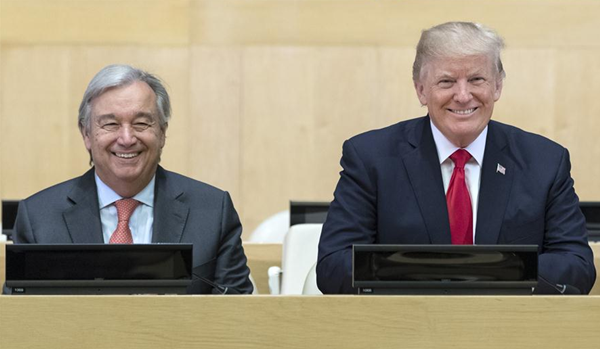In Trump's UN debut, the old is the new
- By Sumantra Maitra
 0 Comment(s)
0 Comment(s) Print
Print E-mail China.org.cn, September 25, 2017
E-mail China.org.cn, September 25, 2017
|
|
|
United Nations Secretary-General Antonio Guterres (left) and US President Donald Trump pose for a photo prior to a high-level UN reform meeting at the UN headquarters in New York, Sept 18, 2017. [Photo/Xinhua] |
In front of the green marble dais, which Donald Trump so hated during his election campaign that he vowed to change it, if given a chance, the president of the United States made his United Nations debut to present his political doctrine, and quashed the idea once and for all that he is a realist.
The old is the new, and the establishment republicanism is back. In a summit given a miss by President Xi, President Putin, and Chancellor Merkel, for respective domestic reasons, President Trump was given his chance for a starring role.
The speech he delivered had all the elements of classic Trumpian rhetoric, superficially dark, bereft of diplomatic civilities, with extempore linguistic twists, adjectives after adjectives, and content wise, no different than the bipartisan American foreign policy pursued since 1993.
In Britain, The Guardian and the Financial Times lamented it as dark, brooding and isolationist, but that was more out of their personal convictions and opposition to Trump than actual fact. In no way was the speech isolationist.
Trump said that major parts of the world were in conflict and some were, infact, going to hell. He said, he would destroy North Korea, only as a retaliatory measure if U.S. is faced with no choice but to defend its territory or that of close allies. That cannot, in any way, be called isolationist.
Trump also called the Iran nuclear deal an embarrassment to the United States, but stopped short of explicitly discarding it, possibly as a means for further negotiations. The deal was signed by all the veto-wielding members of the Security Council, and all America's allies, and even Israel saw the deal as stopping an Iranian rush for bombs.
Despite what people say, Trump's speech wasn't very isolationist or even the statement of a realist; actually, it was very neo-conservative. Analysts immediately pointed out that Trump's real intention was to make President Xi Jinping bear down on North Korea. This is a situation that has vexed analysts for a long time, as both China and the U.S. prefer a denuclearized Korean peninsula, and neither want a Korean war, leaving them in a loop with seemingly little control.
Secondly, some of the statements are markedly different from the America First attitude of the campaign. Trump said: "If the righteous many do not confront the wicked few, then evil will triumph. When decent people and nations become bystanders to history, the forces of destruction only gather power and strength."
In no way can that be presented as a realist argument, when all he was saying was that nations must go on a moral crusade.
To be fair to Trump, he did stray into an area taboo for American presidents for the last quarter century, that sovereignty is important and cultures and regimes are different; that nation states are still the most important actors in international affairs.
Yet, he tied it up in a liberal argument. "We must protect our nations, their interests and their futures. We must reject threats to sovereignty, from the Ukraine to the South China Sea," he said.
In a way, this marks a softer liberal stance, which is a welcome change. It indicates, while America will still continue with the Pax Americana in regard to sea trade routes, the days of outright promotion of democracy might be over.
However, as always, what Trump says is not very important. What is important is what he does. As of now, he hasn't started a trade war with China or put America on a war footing with North Korea; he hasn't quit NAFTA and didn't start building any new wall on Mexico border; and he definitely didn't antagonize China, but tried a mutually respectful start. I think that will continue.
Sumantra Maitra is a columnist with China.org.cn. For more information please visit:
http://m.formacion-profesional-a-distancia.com/opinion/SumantraMaitra.htm
Opinion articles reflect the views of their authors only, not necessarily those of China.org.cn.






